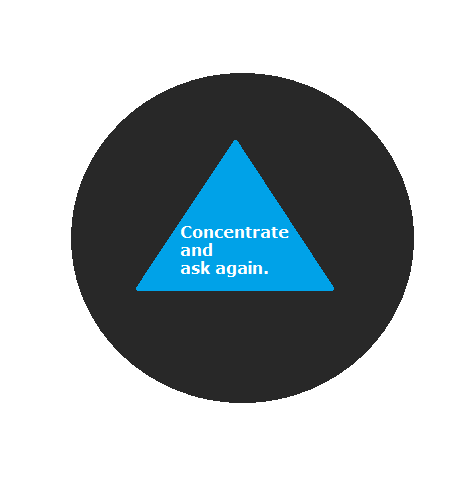The Magic SEO Ball has been asked to comment on the advice of a soi-disant SEO professional, to wit, that UTM parameters on incoming links do not affect SEO:
Not if you use the rel=”canonical” tag to specify the URL that you’d like Google to rank.
To support his case, he quotes Gary “Real Time Panda” Illyes:
Yeah, although if they are not canonical, they’ll funnel the PageRank as well as other signals to the canonical URL
Is he right?
Magic SEO Ball says: concentrate and ask again.

As the Magic SEO Ball often says, SEO is easy to do, but difficult to do well.
This question is a perfect example of one that separates the people who learned a little bit about SEO by reading some blogs from the people who understand SEO very well and generate immense amounts of money for their clients and employers.
Let’s consider this a few different ways:
Ranking
Suppose you have a page on your site like https://domain.tld/page/`, with a self-referencing rel=canonical. Suppose you receive an incoming link that points tohttps://domain.tld/page/?utm_source=google`, which correctly also has a rel=canonical pointing to `https://domain.tld/page/`.
What will the effect of that link be? Will it cause the URL with the tracking parameter to outrank the clean URL? Almost certainly not. 99 times out of 100, search engines will understand and respect webmasters’ URL canonicalization.
On the rare occasions that they don’t, it’s usually because something else is wrong: perhaps rel=canonical has been implemented incorrectly sitewide, and therefore is being ignored. Or perhaps a non-canonical URL is getting the overwhelming majority of links, both internal and external.
So in this narrow case, the advice above is right, and UTM parameters will not affect your SEO.
Crawl resources
Suppose your site domain.tld has on the order of 1,000 pages, of which 900 have been crawled and 800 are currently in Google’s index.
Now suppose you’ve built out a product catalogue with 1,000,000 SKUs, each of which is to get its own page. You need to get all of those URLs crawled, right? But you haven’t even gotten the full 1,000 existing URLs crawled.
So you submit XML sitemaps in Search Console and, in order to improve your site’s crawl budget, suppose you are doing the obvious: investing in improvements to page load time and acquiring backlinks. Now suppose that all of those backlinks point to non-canonical UTM-parameter versions of your product URLs.
Do the links help you? Of course they do, but because these links don’t point to canonical URLs, they do not help you as much as they could. At a time when you need to focus on getting the bulk of your product catalogue crawled so it can be indexed and start ranking for things, your site’s crawl budget is being spent on Googlebot crawling URLs that are not meant to rank for anything, rather than URLs that are meant to rank for things.
Making the best use of a site’s crawl budget, and improving its crawl budget, are not issues that matter for tiny sites in uncompetitive niches. For big sites, though, it matters a lot.
Diffusion of link equity
Building links to your site will help your pages rank for things, and building links to the specific pages that you want to rank (with keyword-rich anchor text) will help more.
But what happens if your page https://domain.tld/blue-widgets/` doesn't get a link, buthttps://domain.tld/blue-widgets/?utm_source=google` (with correct rel=canonical) does? Search engines will pass the link equity from the non-canonical URL to the canonical URL, just as their representatives say they will. But there is no commitment, and no reason to believe, that all of the link equity will be passed. Estimates vary, but I have a difficult time believing that more than 90% of the PageRank from https://domain.tld/blue-widgets/?utm_source=google` would be passed tohttps://domain.tld/blue-widgets/`.
As with crawl budget management, diffusion of link equity is highly unlikely to be a problem for a small site, or a site in an uncompetitive niche. But when you graduate to making million-dollar SEO decisions on a daily basis, on sites with millions of pages and millions of visits, this sort of thing can be ruinous.
The advice therefore wasn’t quite entirely wrong: in many cases, it’s correct to say that links with UTM parameters will not affect your SEO. But as with a lot of SEO advice that you can read from people’s blogs who learned SEO entirely from reading other people’s blogs, it’s not quite entirely right, either: in some cases, including the cases where the most is at stake, links with UTM parameters absolutely can affect your SEO.
Listening to Google
Let’s return to what was actually said.
Gary Illyes was asked:
do utms neutralize backlink value?
(I don’t know what “neutralize” is supposed to mean in this case, but it’s hardly germane.)
He answered:
Yeah, although if they are not canonical, they’ll funnel the PageRank as well as other signals to the canonical URL
“They’ll funnel the PageRank.” Did he say that they’d funnel all the PageRank? No, he did not.
“as well as other signals.” Did he say that they’d funnel all the other signals? No, he did not.
Twitter is loads of fun, but it is not possible to answer complex SEO questions in 280 characters or fewer. My advice: don’t assume that a twitter answer is complete, especially when it appears to confirm what you think you know from very superficial experience.